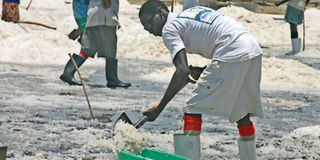Salt firms, agency lock horns over billions ‘owed’ for use of sea water

Workers at Malindi Salt Works Ltd shovel crystallised salt. The firm, alongside Kensalt Ltd and Krystalline Salt Ltd, are on the Water Resources Authority radar over a purported debt amounting to billions of shillings for the use of sea water in the manufacture of table salt. PHOTO | FILE | NATION MEDIA GROUP
What you need to know:
- WRA is demanding from Krystalline Salt Ltd Sh2.07 billion, Malindi Salt Works Ltd (Sh7.56 billion), and Kensalt Ltd (Sh270 million) plus interest.
- Under Rule 104(2), the accounting period for the charges is quarterly and payments ought to be made by the 15th day of the next month after every quarter.
Should salt producing companies pay levies for the enormous amounts of sea water they use in the production of salt?
This is the question three companies, popular with their table salt brands, want the courts to determine.
This is after the Water Resources Authority (WRA), formerly known as Water Resources Management Authority (Warma), demanded that they pay hefty amounts for use of sea water to produce the salt.
WRA is demanding from Krystalline Salt Ltd Sh2.07 billion, Malindi Salt Works Ltd (Sh7.56 billion), and Kensalt Ltd (Sh270 million) plus interest.
The Water Act of 2002 and the Water Management Resources Rules of 2007 vested WRA with the power to issue water permits and charge for water use.
The Act was repealed and the new Water Act of 2016 came into force on April 21, 2017. WRA’s functions remained the same and only its name changed.
THREE COMPANIES
The charges being demanded from the three companies are for varied periods, for each of the company, but cover between October 2007 and March 2017.
WRA argued, in the cases that were separately brought against it by the companies, that it had made several efforts to have them settle their debts in vain, prompting the Authority to estimate the amount due.
Through Legal Notice No. 171 of 28/9/2007, water use charges were gazetted requiring water users to pay to WRA 50 cents/m3 for the raw water they got for their use with effect from 1/10/2007.
Under Rule 104(2), the accounting period for the charges is quarterly and payments ought to be made by the 15th day of the next month after every quarter.
Following the gazettement, the companies were under an obligation to pay for the raw water they used for the commercial production of salt at the rate of 50 cents/1m3 from 1/10/2007.
The firms are required to submit a self-assessment form indicating the actual water used to enable WRA calculate the charges due.
CALCULATE CHARGES
“Due to Malindi Salt Works’ failure to submit self-assessment forms indicating actual water used, we have been compelled to estimate the amount of water they used in order to calculate the charges owing and due to us from them,” said WRA in court papers.
The Authority’s determination to collect the amounts due has also been bolstered by a favourable verdict in April this year where High Court Judge Kossy Bor directed Krystalline Salt to settle the amount.
Krystalline Salt, however, got a temporary reprieve after Court of Appeal Judges Philip Waki, Roselyn Nambuye and Agnes Murgor stopped WRA from demanding the amount pending the hearing and determination of the appeal.
In obtaining the stay on November 9 this year, the company was directed to deposit a security of Sh100 million by January 2019.
On February 22 this year, High Court Judge James Otieno Olola also stopped WRA from demanding Sh270,295,759.90 from Kensalt Ltd, to allow the company argue its case before the Supreme Court.
Kensalt Ltd seeks to demonstrate that sea water is not regulated under the Water Act in the manner suggested by WRA and the firm does not require a permit for the use of the sea water.
SEA WATER
“The absence of the term sea water in the express definition of “water resource” under section 2 of the Act is a clear indication that it was plainly not the intention of the legislature to define sea water as a water resource,” Kensalt Ltd argued.
The firm averred that the National Land Commission has exclusive jurisdiction over sea water falling within the territorial sea and the exclusive economic zone.
However, Supreme Court Judges Mohamed Ibrahim, Jackton Ojwang, Smokin Wanjala, Njoki Ndung’u and Isaac Lenaola ruled that they found no situation that prevents Krystalline and Malindi Salt Works from setting down their own cases for hearing and determination, possibly lodging appeals thereafter, in the event of unfavourable outcomes.
They reasoned that there were no orders stopping the cases filed in the other courts, where these companies have their cases pending.
CASES HEARD
They also noted that the two had made no attempts to have their cases heard jointly in the courts below and there was, therefore, no basis to consolidate the cases in the highest court.
“Indeed, a genuine concern on their part for an opportunity for a hearing should have led the applicants, at the very beginning, to seek a consolidation of their cases at the court of first instance,” observed the judges in their August 31, 2018 judgment.
They summarised by stating that they are not convinced that there is a prejudice that Krystalline and Malindi Salt Works stand to suffer in the Supreme Court, but which they would not have suffered in the other courts. With the verdict, the companies’ fighting chance now depends on how they will individually present their cases against WRA before different courts.




